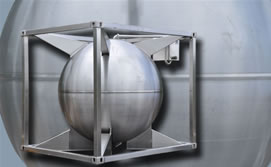On June 28th the two prototypes of the LIFE+MERSADE project (Mercury Safety Deposit) were presented in Almadén. The project’s main goal is to develop safe and stable methods to store mercury metal under permanent surveillance.
The EU decided in January, 2005 to act on the issue of safe storage of the surplus metal produced by European industry. It is estimated that some 12,000 tons of surplus mercury will be produced by the chlor-alkali industry during the next 15 years. In 2008, a Community regulation was adopted which establishes that as of March, 2011, mercury metal must be considered as a waste product and treated such that is does not represent a risk to either human health or the environment.
Spanish experience in the handling of this metal, for which Spain has historically been the world’s top producer–extracted from the mines of Almadén–led the EU to charge the Spanish consortium with the development of this technology.
The first prototype resulting from the MERSADE project is a steel container with 50 tons of capacity, possessing two levels of watertight chambers and a system of permanent remote surveillance and monitoring. The design includes security barriers that keep the metal stored within a second watertight chamber in case the first accidentally malfunctions, and communicates the situation to an alarm system.
The second system shown consists of a stabilization and solidification technique for mercury metal, through the use of a special cement containing sulfur. This results in permanent storage in solid form that does not contaminate.
